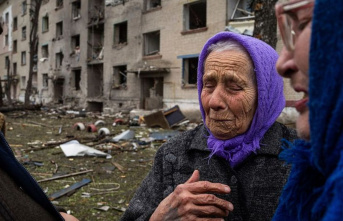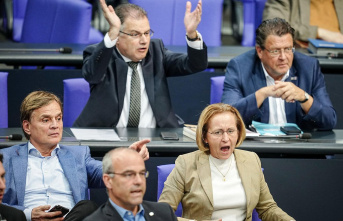Since half a year, the countries of the so-called Good-Kita-law a lot of money from the Federal government for better day-care centres. Trade unions and protection of Children see up to now but not much progress, and have doubts as to whether the law works over the long term.
Berlin (Reuters) - Several kindergartens in Germany over the Extra money, if the day-care centre prize is awarded. There is prize money of 10,000 to 25,000 euros.
For exactly six months, the funds from the so-called "Good-Kita-law flow now" - here the cheering stops, however, is limited. The education and science trade Union (GEW) and the German child protection Association to draw a critical balance sheet. Ministry for family Affairs, and experts say it is still too early to assess the impact of the law.
On the "law for the further development of the quality and participation in the children's day-care," as the Minister for the family, Franziska Giffey (SPD) to the "Good-Kita-law" umgetaufte conveyor program is actually called, the Federal States to 2022, Euro 5.5 billion. 16. December of last year, began the withdrawal.
you can put The money into more teachers, better pay for the staff, longer opening Hours or the redesign of spaces and play areas invested. Also, the reduction of kindergarten fees is possible. Every third Euro of the Fördergelds use the country for it.
Exactly criticized the German child protection Association, which is itself a carrier of many day-care centres in Germany. "So clearly, the relief for parents, we keep these priorities at the current time, however, is wrong," said President Heinz Hilgers, the German press Agency.
The shortage of skilled workers in the educator professions is dramatic. Reasons for this are the low pay and the working conditions are. "The alleged murder of a toddler in Viersen, was a historic case. But nevertheless, an obviously unsuitable governess new jobs could compete, shows that the shortage of skilled workers is the most urgent Problem." Thus, the Good-Kita-law make a really good day-care centres, should be improved working conditions and the pay for teachers in a sustainable way.
The criticism of the Fees or exemptions is not new. Experts, Opposition, and also the cities and municipalities had criticized repeatedly. Minister for family Affairs, Giffey had to say: "We want to go in both directions: We want more quality in the children's day-care, but we also want to enable access and participation. We still have parents in Germany, saying: I would give my child in the Kita, but I can't afford that."
falls Critically the interim balance of the "Good-Kita-law," also at the trade Union for education and science: "in the past, is not to recognize that the law will lead to more quality in the day-care centres," said Board member Björn Köhler of the dpa. An assessment is currently due to the Corona-crisis is very difficult, he said. The Union does not expect, but also in the long term, so that the law will lead to a sustainable increase in quality. To qualified personnel is necessary. Training and on-going costs would not be covered by the "Good-Kita-law," said Köhler. Already after the law was decided, he had demanded that not a total of 5.5 billion, but EUR 10 billion per annum would be for the day-care centres is necessary.
From the point of view of the Federal Ministry for family Affairs is to take stock of the "Good-Kita-law" too early. The end of the year, a first so-called monitoring is going to appear to report, a spokeswoman said. Only then "can we meet for the first time, statements about the changes in the children's day care that have triggered the measures by the länder, and". The law stipulates that the implementation will be scientifically monitored and that the need for countries to regularly submit progress reports on the implementation of measures - all this will be included in the annual monitoring report.
on behalf of the Ministry, the implementation of two research teams: the Professor of early childhood education, Stefan Faas (Pädagogische Hochschule Schwäbisch-Gmünd) and to the Professor Maike Rönnau-Böse (Evangelische Hochschule Freiburg) is evaluated. Both also emphasize on demand that it is still too early to make statements on the implementation of the "Good-Kita-meeting law". "We take into account in our impact analyses, the perspectives of all the stakeholders in the early childhood education and care - by representatives at the country level to the parents and children. Accordingly, a comprehensive collection of data is created and needs time for implementation," said Rönnau-Böse.
Date Of Update: 17 June 2020, 17:33










